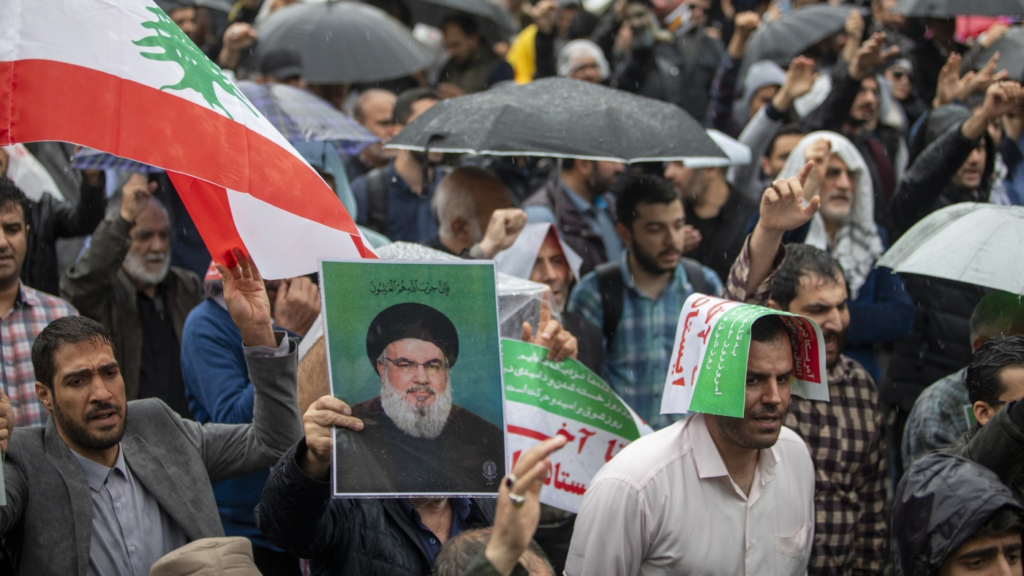Hezbollah chief Hassan Nasrallah, a prominent leader of the Iran-aligned Lebanese militant group, has been temporarily buried in a secret location.
The news of his temporary burial was confirmed by a source close to the group, who spoke to AFP on Friday (October 4). The Hezbollah chief was killed in an Israeli strike in Beirut last week, marking a significant blow to the militant group amid escalating tensions between Israel and Hezbollah.
Hezbollah Chief’s Temporary Burial
The temporary burial of the Hezbollah chief comes in accordance with Shiite Muslim funeral rites, which allow for such arrangements when circumstances do not permit a proper funeral or when the deceased cannot be buried in their desired location.
Read : Nasrallah’s Son-In-Law Killed in Israeli Strike in Syria
According to the source, Nasrallah will remain in this undisclosed location until a public funeral can be held. This decision is likely influenced by the ongoing conflict and security concerns that have made a public funeral impossible at this time.
Read : Will Fight With No Rules If Israel Wages War on Lebanon: Hezbollah
Nasrallah, who was 64 years old, had led Hezbollah for decades, playing a central role in shaping the group’s strategy and regional alliances. His death is seen as a significant moment for the organization, as Israel continues its military campaign in Lebanon and Gaza.
Impact of Nasrallah’s Death and Ongoing Tensions
The death of the Hezbollah chief comes at a time of heightened tensions between Israel and militant groups in the region. Hezbollah had been involved in launching low-intensity strikes on Israel since last October, in support of its Palestinian allies in Gaza.

These attacks forced tens of thousands of Israelis living in the north of the country to flee their homes, adding to the instability in the region.
The Israeli strikes in Lebanon that led to the death of the Hezbollah chief are part of a broader escalation that began on September 23. Since then, Israeli bombing campaigns have resulted in the deaths of more than 1,000 people in Lebanon. Nasrallah’s death marks a critical moment in this conflict, as Hezbollah has long been a key player in the Lebanese-Israeli tensions.
Speculation About Nasrallah’s Funeral and Future of Hezbollah
In the days following his death, there were speculations that the Hezbollah chief’s funeral would take place in Iran, where Hezbollah maintains strong ties with the Iranian leadership.
However, no formal announcement has been made about the details of the funeral. The temporary burial underscores the uncertain situation on the ground and the challenges facing Hezbollah as it navigates the aftermath of its leader’s death.
The death of the Hezbollah chief has created a leadership vacuum within the group, raising questions about its future direction.
While Nasrallah was a controversial figure, he was instrumental in uniting Hezbollah and maintaining its influence in Lebanon and beyond. His absence may leave the group vulnerable to internal divisions and external pressures from Israel and other regional actors.
Hezbollah Chief and the Regional Conflict
Hassan Nasrallah had been a central figure in the region’s complex political and military landscape. Under his leadership, Hezbollah became a significant player in Lebanon’s political scene and a key ally of Iran in the broader Middle East.
The group’s involvement in the Syrian Civil War and its ongoing conflict with Israel cemented its reputation as a formidable militant organization with considerable influence.
However, the death of the Hezbollah chief comes at a time of shifting dynamics in the region. The Israeli-Palestinian conflict, which saw a significant escalation with the deadly attack by Hamas on October 7 of last year, has now expanded into northern Israel and southern Lebanon.
As a result, Israel has shifted its focus to securing its border with Lebanon, a move that underscores the potential for further violence in the region.

The temporary burial of the Hezbollah chief marks a turning point for the organization and its role in the regional conflict. While Nasrallah’s death is a significant blow to Hezbollah, it remains to be seen how the group will respond in the coming weeks and months.
The ongoing Israeli bombing campaign in Lebanon, coupled with Hezbollah’s continued strikes on Israel, suggests that the conflict is far from over.
Hezbollah’s ability to regroup and reassert its influence in the region will depend on its next steps, including how it handles the transition of leadership following Nasrallah’s death.
As the situation in Lebanon continues to evolve, the group’s future direction will be closely watched by both its allies and adversaries.

